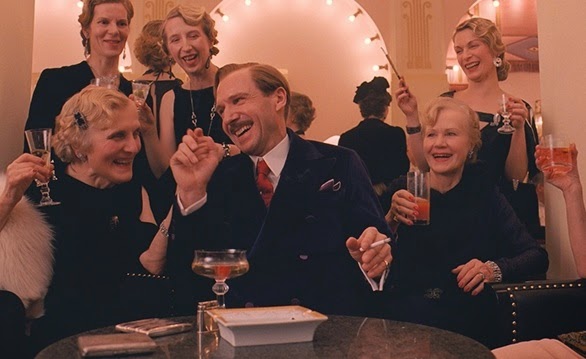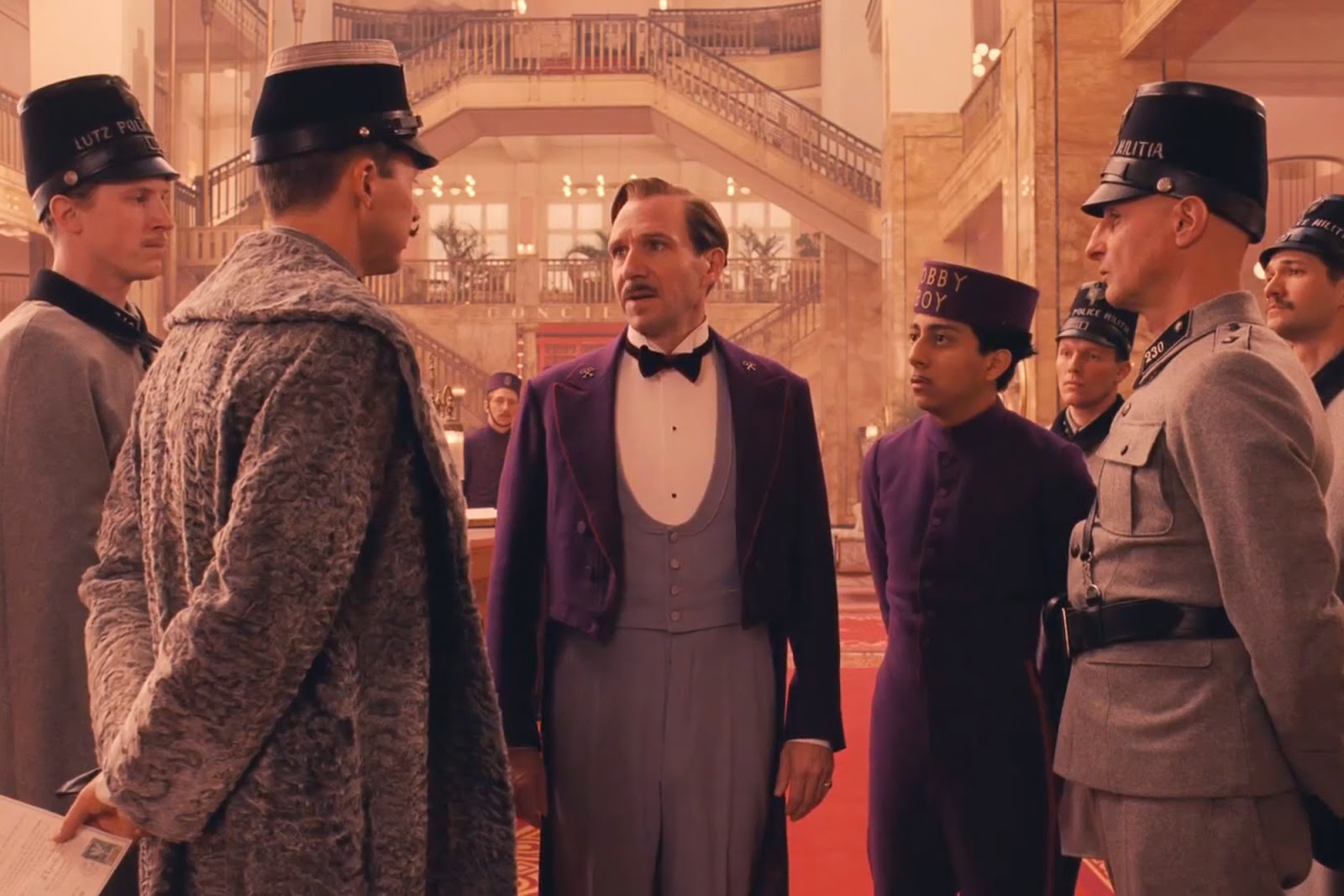Monsieur Gustave is the clear star of Wes Anderon’s latest quirky creation, The Grand Budapest Hotel. He is a fascinating modern cinematic hero, made even more intriguing because he is not a typical leading man. He does not swagger across the screen, or manfully clench his jaw or throw out sarcastic quips. He is not a dorky boy waiting to level up in badass to get the girl and save the world, nor is he a man-child refusing to grow up, nor is he a coldly logical intellectual stoic, nor is he an all-American manly man. Instead, he has manners so genteel that they could be considered effete. He is a caricature of a 19th-century gentleman played straight.
Monsieur Gustave is the supremely effective concierge of the Grand Budapest Hotel in 1932, when the main action of the film takes place. He has a signature scent (eau de panache), is scrupulously attired in a purple suit, and recites poetry whenever the mood takes him (even when his audience has more pressing concerns). He is polite, gentle, kind, generous, fastidious, witty, warm, tactful, charming, and meticulous.
The Grand Budapest Hotel is an extension of Monsieur Gustave’s cultured soul. It is an oasis in a brutal world, a shelter of civilization, and he runs it with a firm hand. Mr. Gustave’s, and, in extension, the hotel’s, mission is to make people happy. No detail is too small. No request is too trivial. The Grand Budapest is orderly, refined, and luxurious. Within the hotel, Monsieur Gustave has created the world in which he wishes to live. Like all good things, it cannot be sustained forever. When fascist soldiers invade the hotel, Monsieur Gustave sadly notes: “The beginning of the end of the beginning has begun. The sad finale played off-key on a broken-down saloon piano in the outskirts of a forgotten ghost town. I’d rather not bear witness to such blasphemy.” The glory and majesty of the Grand Budapest is destined to fade. And once Monsieur Gustave is gone, the hotel never recovers. Even with Zero, eager bellboy turned protégé, trying to carry on his mentor’s legacy, the hotel slowly sinks into decay. It becomes a crumbling relic of a more refined time. It is as if without Monsieur Gustave, the hotel has lost its heart.
Monsieur Gustave could be viewed as a dandy or a fop, but that would be a mistake. He may be vain about his appearance and usually speaks with a practiced elegance, but he is not silly or shallow. His vanity is a defense against an uncivilized world. His appearance and manners are his armor and his weapons against the barbarians always hammering at the gates. A well-pressed suit won’t hold civilization together, but it is proof that not everything must be nasty and brutal.
What makes Monsieur Gustave a true hero is his loyalty and bravery. His punctilious attitude could be mistaken for weakness. Monsieur Gustave is many things, but weak is not one of them. He’s steely through and through, willing to stand up for his ideals even if it means his death. He is the rare man who has the courage to live up to his own convictions. He believes in a better, more genteel world. His morality is one of manners. If we could all simply be civilized, we would not have to brutalize and destroy one another. If the world was the Grand Budapest, we could all live in beauty and culture. Monsieur Gustave’s impeccable manners are a philosophy, a lifestyle, and an ideal. He carries them with him even in the harshest of circumstances. Imprisoned, Monsieur Gustave politely offers his fellow inmates soup and takes gruff rebuffs with grace. He mainly leads by example. With the staff at the Grand Budapest, he is strict and firm – quick to correct a mistake, but also quick to praise.
He has his own high ideals and standards, but he doesn’t come across as judgmental – although perhaps disappointed with the lack of graciousness in others. It is almost a paternal disappointment with an errant child that one knows can behave better, but rarely does. When treated with courtesy by a fascist officer after being manhandled by the officer’s underlings, he comments to Zero: “You see, there are still faint glimmers of civilization left in this barbaric slaughterhouse that was once known as humanity.” The world is brutal and cruel, yes, but maybe if it saw what it could be, it would choose to live up to its own best self. Monsieur Gustave is optimistic enough to act as if his ideals will be met, but knows they never will be. At his core is the deep cynicism of a Russian author. he carries on, being a glimmer of civilization in the darkness of the world. And yet Monsieur Gustave maintains his graciousness and kindness. The world may collapse around him, but his standards will never be shaken. He lives up to his own ideals to the last.
Monsieur Gustave is of course not perfect. He swears (“this has been a complete fucking nightmare! Just tell us what the fuck is going on”), he throws punches, and he seduces older female guests. Some label him a gigolo, but it is unclear where his motivations lie. Maybe he seduces elderly women for his own vanity, maybe for financial reward, maybe as yet another service for his guests – maybe all three. Zero points out that the women Monsieur Gustave seduces are invariably “rich, old, insecure, vain, superficial, blond, needy,” adjectives that he notes could apply to Monsieur Gustave as well. Monsieur Gustave does appear desperately lonely – there’s no evidence of friends and family, and his human connections in the film are solely his elderly sweethearts and his protégé Zero. He is kind and considerate to everyone around him, but usually remains reserved. Perhaps because once he gives his heart, he gives it without reserve – he takes Zero under his wing and is loyal to him unto death. Or perhaps Monsieur Gustave’s world revolves around the Grand Budapest, and he is so dedicated to his hotel that he has little time to establish deep relationships with people.
Monsieur Gustave’s eyes hold a deep sorrow. Even when he is
gleeful and chipper, there’s an underlying current of sadness within him. Maybe
this is because of his loneliness, or his insecurity. Or maybe it is because he
expects the world to be better, but knows it will inevitably disappoint him.
For the most part, rudeness is almost a personal affront to Monsieur Gustave. Even angry, he is all polite steeliness. Only once does he truly lose it and the turbulent soul under the gently smiling façade bursts out. He yells at Zero until he is shut up by the revelation of Zero’s tragic past. The loss of control is terrifying, more so because Monsieur Gustave usually holds himself together so tightly. And it is brutal, because he takes his anger and frustration and pain out on Zero, who has put himself on the line to rescue his mentor. Monsiuer Gustave’s polite mask does return and he apologizes. But it is a view into the darkness underneath the veneer of civility. This outburst shows that Monsieur Gustave is not gracious and respectful simply because of his nature – it is something he chooses and works at. It is a defense against a cold and brutal world. But that only makes it more impressive. Civilization is not a default. It is a choice. It is a conscious decision each of us makes every day. Most people only choose it when it is easy. Monsieur Gustave is heroic because he chooses it – mostly, with the rare falter- even when it is hard.
Monsieur Gustave likely consciously cultivated his manners, and was not born into them. Although he has the airs of an Old World aristocrat, he has a job in the serving class. And although his appearance and his behavior are usually meticulously genteel, his rougher ways (the swearing, the resort to physical violence, his outburst with Zero) are never completely masked. He likely grew up witnessing exactly how harsh the world can be. He was not coddled and sheltered from birth, like a true blueblood. Maybe he caught the occasional glimpse of beauty, but his surroundings were likely practical and sparse – no money or time to recite poetry or buy a painting, when all resources had to go to food and shelter. Or maybe he was the child of servants, living in the downstairs world, yearning for the upstairs world of beauty and culture. He clearly valued his own education, and cultivated in himself the virtues he wanted. He learned his manners somewhere – maybe as a bellboy in the Grand Budapest, watching the wealthy guests as they flitted in and out. Monsieur Gustave did not become the man he is because he was born to it – you can see the dedication he put in, training himself until it became a habit. Monsieur Gustave created in himself a pastiche of a true gentleman. He took the ideals of gentlemanhood and inhabited them. It would be almost a caricature, if he wasn’t so steadfastly earnest. The type of gentleman that Monsieur Gustave models himself after likely never truly existed. And if it ever did, it had vanished by 1932, with the fascists bleeding and brutalizing the world. He is the last man of a lost era that never was. Or, as Zero puts it decades after Monsieur Gustave’s death, “I think his world had vanished long before he ever entered it. But I will say he certainly sustained the illusion with a marvelous grace.”
Monsieur Gustave can be summed up by Zero’s echoing of his
earlier pronouncement: “There are still faint glimmers of civilization left in
this barbaric slaughterhouse that was once known as humanity…He was one of
them. What more is there to say?”








No comments:
Post a Comment